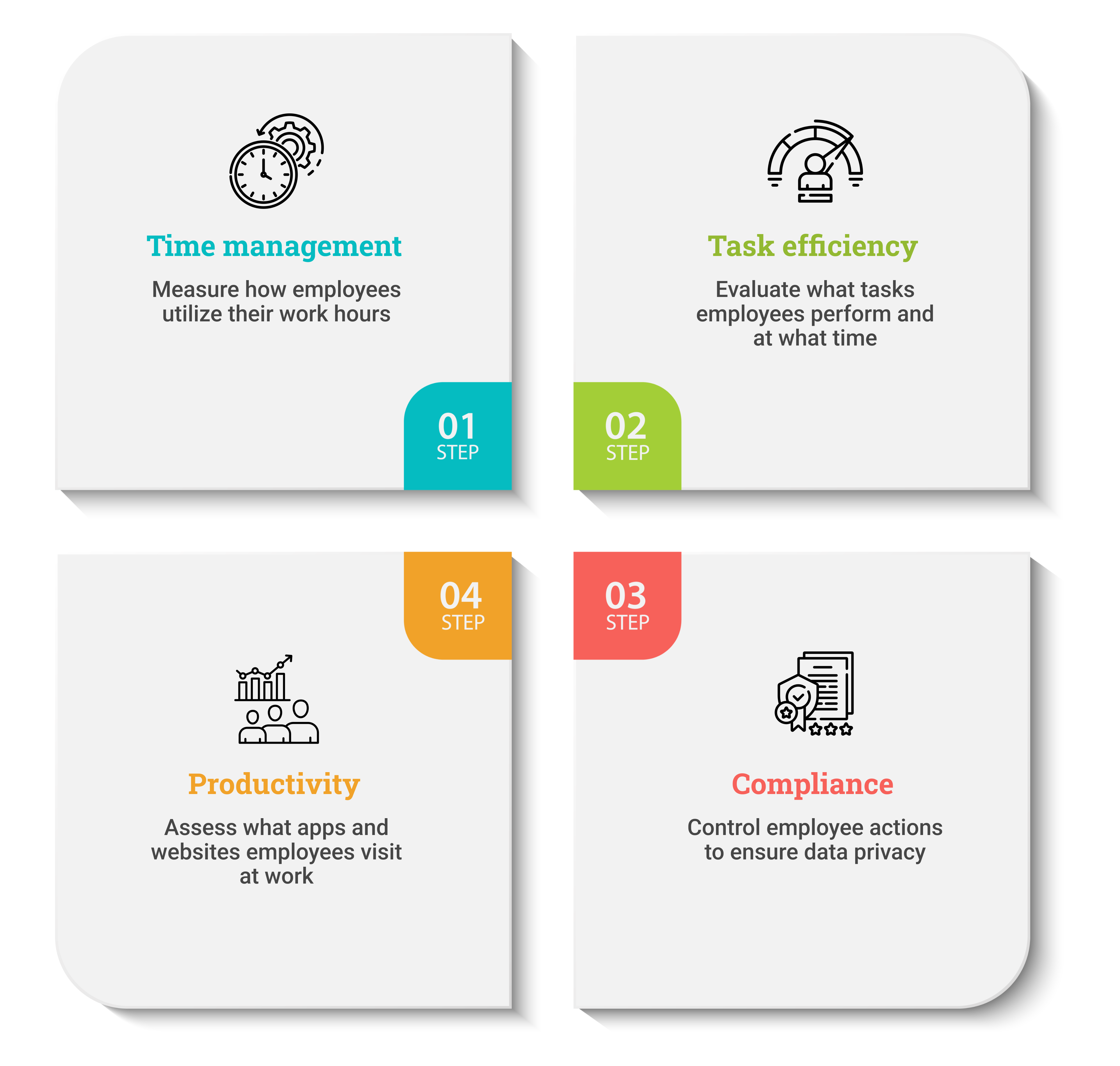How employees behave at work defines operational efficiency. It reflects what time they take to complete what tasks and achieve what productivity. Predicting employee behavior not only helps in evaluating employee performance but also in controlling compliance with business policy and data privacy.
Table of Contents
Let’s understand the factors that indicate accountable employee behavior at work:
Factors that indicate accountable employee behavior at work

Read More : How workforce analytics helps with contact center efficiency
Employee behaviors drive or disrupt workflows. These are the factors that hint at how accountable employees perform at work. Let’s discuss a few important employee behaviors:
Time management
How employees utilize their time results in what time they consume in performing tasks. What are their productive app and web usage, controlled use of break, aux, and idle time, and time spent being active at work lead to optimized work hours with enhanced productive performance.
Task efficiency
Optimized employee work hours indicate improved employee efficiency at work. Employees performing aligned with business goals and project timelines better contribute to business growth. Such employees are more capable of delivering improved productivity at work.
Productive work
Employee efficiency compliments increased productivity. Teams bound with office hours perform timely work and deliver better results within the defined job hours. It adds to employee productivity and helps them meet, even outperform expectations.
Data compliance
Productive employees work unaffected by distractions at work. They ethically behave following business policy and data privacy that ensures compliant behavior at work and helps avoid risks to client trust and business reputation.
Team collaboration
Productive and compliant teams stay accountable to their roles. They believe in better collaboration among teams and connect to discuss work, plan strategies, and ask suggestions to improve and deliver quality results.
How to find high performance employee behaviors in the workplace
The answer lies in employee productivity monitoring to know about high performer personalities in your teams. Getting help from an effective productivity monitoring software is of utmost need now when organizations are adopting the future of work, and more teams are working in distributed environments.
Let’s explore the key reasons why employee monitoring software is important and how it can help answer what are the qualities of a high performer:
Measure employee activities
Employees perform what tasks, at what time, and with what productivity indicate if they work aligned with the business goals or if their work patterns disrupt their performance. Measure the impact of employee activities on employee efficiency with high performance employee reviews and analyze if they’re bound by the project timelines.
Evaluate employee efficiency
Employee activities reflect employee efficiency at work. Assess if they perform tasks time-bound manner or if their work patterns are not aligned with the project timeline. With the help of employee monitoring software, you can identify the signs employees are high performers at work and what percentage of employees have high potential to perform.
Read More : Importance of Employee Productivity Monitoring in Distributed Work
Address key performance factors
Identify the factors that affect employee performance. Measure how engaged they’re at work, what their utilization ratios are, and how productive they perform. Analyze their activities to learn what goes well for them and what causes distractions to control inefficiencies and encourage more productive work.
How to acknowledge high performing employees
Employees who outperform can encourage others to follow. You need to identify how much more productive are high performers. Analyze how they work and what drives employee performance. Let’s discuss a few effective ways that can help:
Assess employee time
Measure how employees utilize their time and spend the day at work. Evaluate what part of their work hours are active, idle, break, and aux time. How their activities at different work times impact their efficiency. It helps find out inefficiencies and weigh on more efficient performance.
Productivity analytics
Find out what tasks they perform within defined work hours. Discover what apps and websites they visit and what are productive and non-productive. Control non-work-bound apps and websites, and encourage more optimized use of work hours.
Compliance and data privacy
Detect employee actions to predict risky employee activities and control compliance with data privacy and business regulations. Enable AI-powered violation detections to ensure clean desk policy and negate instances of non-compliance and data breaches.
Get wAnywhere to help you determine high performing employees
Gain employee activity-based real-time data with wAnywhere productivity monitoring software and analyze how employees behave at work and what drives/disrupts their performance with its intuitive dashboard visualization. Start a free trial to see wAnywhere in action today!
What is high employee performance?
Employees aligned with business goals and project timelines show improved commitment to work and can perform more productive work that reflects high potential of them to deliver improved performance.
What are the qualities of a good performer?
A sound performer is highly dedicated to executing more tasks in defined work hours. The key qualities of a high performer include more active hours with fewer breaks and idle time, visiting productive apps and websites to complete projects on time, and constantly contributing to business goals for better growth.
What percentage of employees are high performers?
It depends on how motivated employees are in your organization. If they are more or less, the percentage reflects that and indicates the need for employee productivity monitoring.
What employees are considered high performers?
Employee performance reflects what hours they work and what productivity they achieve. It increases or decreases in proportion to what engagement and efficiency they execute at work. Employee break and aux time, active and idle time, app and web usage play a critical part in driving and disrupting employee performance.
wAnywhere Blog
Check out the wAnywhere blog to learn more about our product, customer stories, and our take on meetings, remote working, productivity, and more.

